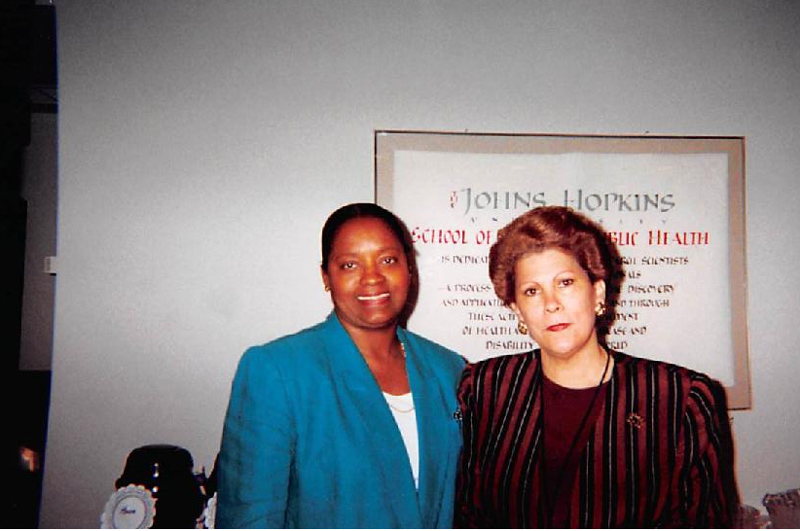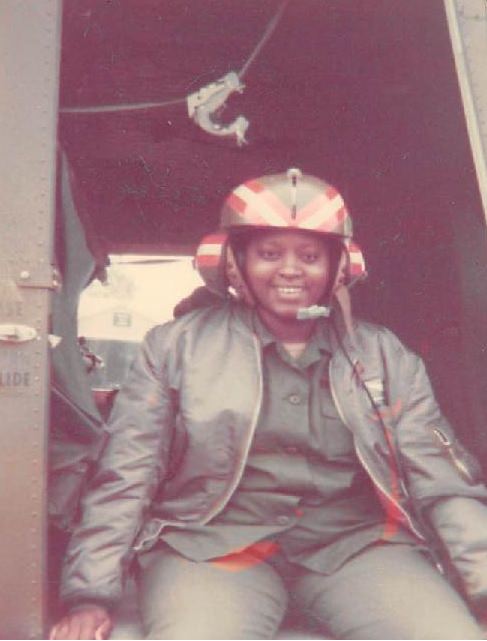Claudia Oglivie Works to Increase Research For Minorities
 “Not all diseases affect people the same,” explained Claudia Oglivie, a recent graduate of the Nursing Science Ph.D. program. “When we look at the incidence of disease and break it down by ethnicity and race, we see distinct differences.
“Not all diseases affect people the same,” explained Claudia Oglivie, a recent graduate of the Nursing Science Ph.D. program. “When we look at the incidence of disease and break it down by ethnicity and race, we see distinct differences.
Oglivie became interested in minority research while assigned to the Military Medical Research Command at Fort Detrick, MD.
During her assignment in the military, she served in various leadership positions and as program manager overseeing various congressionally directed research programs. She worked in women’s health research, breast cancer research, and telemedicine and advanced technology research.
Oglivie explained that it became evident that research in underserved population was limited in many areas. This was also evident in major diseases where the incidence was lower in minority communities but the morbidity/mortality rate was higher.
“At the time I was not a researcher so I was not involved with the science but with the programmatic oversight….but now with the Ph.D., I may be able to contribute to the gaps in research in the minority communities,” she said. “As a member of a minority group, born in Central America, I am passionate about increasing minority research to help explore the issues that affect us.”
She explained that minority research is important because scientists require up to date information to assist in prevention and provide recommendations for care.
“The people in these communities just don’t have the information about how diseases may affect them and their role in contributing to prevention practices. If you consider the plight of the minority community, many are focused on finding work, providing for their families and the day to day challenges. Research is not at the front of their mind,” she said.
Oglivie is passionate about providing education on how minority communities can participate in research. In her study, her participants were very excited about sharing how diseases affected them.
 Achieving a Ph.D. has been a long road for Oglivie, this is her third and finally successful attempt to obtain a doctorate degree. She made previous attempts while on active duty, but the military mission always took precedence and work schedule requirements made it very challenging. She attended the Johns Hopkins School of Public Health while assigned at the Medical Military Research Command in Frederick, Maryland. One of her classmates and colleague was Dr. Antonio Novello, the first Hispanic woman to hold the position of surgeon general. As two Hispanic women, they spent time discussing the issues in minority communities.
Achieving a Ph.D. has been a long road for Oglivie, this is her third and finally successful attempt to obtain a doctorate degree. She made previous attempts while on active duty, but the military mission always took precedence and work schedule requirements made it very challenging. She attended the Johns Hopkins School of Public Health while assigned at the Medical Military Research Command in Frederick, Maryland. One of her classmates and colleague was Dr. Antonio Novello, the first Hispanic woman to hold the position of surgeon general. As two Hispanic women, they spent time discussing the issues in minority communities.
“As an older student, the question is often asked, what are you going to do with your degree? This is self-fulfilling for me because I always wanted the knowledge to be better informed, to be a better instructor, and a participant in the research process,” she said. “I wanted to be able to better
prepare our nurses today.”
Oglivie’s dissertation was on osteoarthritis in Hispanic women 65 years and older.
“Arthritis is prevalent in Hispanic women where activity limitation is notably higher because of socioeconomic factors such as occupation, education, and income. There is a correlation between low education that results in low income and occupations that are labor intensive and jobs in factories that require repetitive body movement,” she said. “In addition, lack of exercise and obesity are all factors that impact osteoarthritis.”
She explained that the Center for Disease Control did a study where they compared Hispanic subgroups i.e., Cuban Americans, Mexican Americans, and Puerto Ricans and found that Puerto Ricans were more susceptible to the activity limitations found in osteoarthritis. She would like to build upon this research by looking at additional factors and the differences in each subgroup.
“There is a correlation between research needs and funding. If there is no funding for the research then you’ll find that there is less research in that area. As a program manager with the Department of Defense, we dealt with funding issues related to research needs. There is an Office of Minority Health that identities their research agenda and that is where I will look for future funding,” she said.
 Oglivie, who is a retired U.S. Army lieutenant colonel, has had extensive teaching experience in both military and civilian training of medics and nurses. Her military assignments included positions in education and administration in military medical centers.
Oglivie, who is a retired U.S. Army lieutenant colonel, has had extensive teaching experience in both military and civilian training of medics and nurses. Her military assignments included positions in education and administration in military medical centers.
She plans to continue teaching in the near future, where she will be able to highlight the importance of cultural sensitivity when working with patients.
“I enjoy teaching, there is quite a lot to learn in a basic nursing curriculum. There is a generational difference in student nurses today compared to when I received training in New York City many years ago. With today’s changing world, cultural sensitivity is essential to the practice of nursing.”
 This article was written by Charlotte Anthony, marketing specialist at the Graduate School of Biomedical Sciences at UT Health San Antonio. This article is part of the “Meet The Researcher” series which showcases researchers at the Graduate School of Biomedical Sciences at University of Texas Health Science Center San Antonio.
This article was written by Charlotte Anthony, marketing specialist at the Graduate School of Biomedical Sciences at UT Health San Antonio. This article is part of the “Meet The Researcher” series which showcases researchers at the Graduate School of Biomedical Sciences at University of Texas Health Science Center San Antonio.
